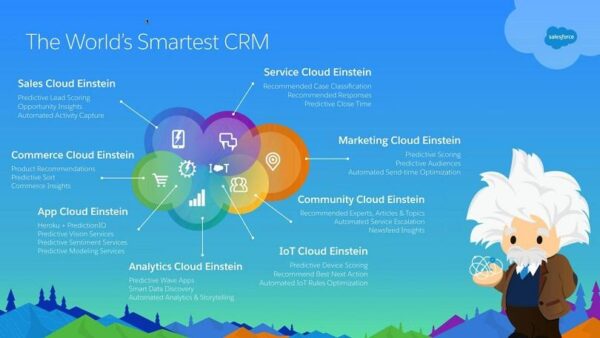Why You Should Be Building Low-Code Salesforce Apps
There’s a reason people drive cars instead of walking, type on computers instead of typewriters, and do math on calculators instead of pencil and paper.
While some people enjoy the recreation of a long walk, the nostalgia of a typewriter, or the discipline of pencil and paper, these have all fallen out of common practice because there are better tools to help us accomplish these tasks.
Knowing and using the right tool for a job is an essential discipline to maximize efficiency and free up your time so you can focus on the things that matter to you.
When it comes to technology, Salesforce is the right tool that can revolutionize your approach to building apps. With robust features and high performance, Salesforce is a powerful platform for low-code apps, and Rainmaker is your secret weapon for Salesforce-managed services.
What Is Salesforce?
Salesforce is a cloud-based software company specializing in Customer Relationship Management (CRM) and sales app development.
Far from being a one-trick pony, Salesforce is home to a wide range of software spanning analytics, marketing automation, customer service, and more. Salesforce allows organizations to develop their apps on their platform, combining Salesforce’s expertise with organizations’ specific needs and resources.
Enter Rainmaker: a company that specializes in Salesforce integration and support. Rainmaker is an expert in the technical aspects of Salesforce integration so that you don’t need to be—it guides your journey with Salesforce products so you can build low-code Salesforce apps without the unnecessary headaches of functionality and integration.
Low-Code Salesforce App Creation
Salesforce makes app creation as simple as possible. By allowing users to create low-code applications, Salesforce maximizes the value its users get out of their platform and enhance the experience every user has with their software.
You can create a low-code app directly within Salesforce by navigating to its AppSetup menu, selecting Create, and then selecting Apps. By selecting different components, you can build your dream app with little to no coding and in a short amount of time.
At least two parties will use apps: the business user and the end-user. Salesforce allows app optimization for both sides. Business users get a clean interface, convenient access to the information they need, and functional tools to automate their processes. End-users (customers) get an intuitive UI, responsive feedback, and a stress-free user experience. By customizing both sides of the app, you can create the best possible experience for everyone who uses it, whether they are the CEO or a new prospective lead.
You can optimize your Salesforce apps for desktop and mobile use. Users can customize different default experiences for desktop or mobile users so that you can polish and customize the user experience across platforms and screen sizes.

Salesforce Trailhead
Although the app creation process through Salesforce is as streamlined as possible, its Trailhead learning platform offers free training and certifications to Salesforce users, so whether you want to create a straightforward app today or invest in growing your coding skills, Salesforce has the tools to help you reach your goal.
Using Trailhead to learn new skills is an intuitive process. Select a role (such as “Developer” or “Business User”) and a badge (such as “Einstein Vision” or “Process Builder”), create or log in to an account, and click the first unit to begin your journey. Trailhead units comprise multi-media presentations, including videos and step-by-step instructions.
Automation
One of the main values of technology is its ability to automate manual tasks, saving hours of human labor. Since Salesforce covers a lot of different disciplines, many tasks are possible with its low-code apps, but one of its best features is the ability to automate tasks.
For example, you might automate your Salesforce app to print a certain document once you’ve reached a milestone in a sales process. Or, you might automate an email reminder to send to prospective clients a few days after a sales call.
Automation through Salesforce allows you to use the right tools for the job to take unnecessary work off your plate.
Salesforce Einstein
Artificial Intelligence is a powerful new frontier in technology. If automation is useful because it replaces human labor, Artificial Intelligence (or AI) is useful because it replaces human attention.
In general, AI is good at recognizing trends in data, but humans are much better at recognizing meaning. In other words, AI is better at identifying patterns, but humans are better at identifying the implications of those patterns.
Salesforce has a unique intelligence tool called Einstein that can process data to find trends that would be invisible to the human eye. Salesforce Einstein can turn those trends into valuable insights, such as identifying high-risk customers, prioritizing leads, and recognizing sales cycles and patterns.
One of Einstein’s most powerful features is natural language processing. The Einstein Language APIs allow users to input natural language (such as “Send Customer ABC their invoice”) that it then analyzes, recognizes the components (“send,” “Customer ABC,” “invoice”), and acts on it without the user needing to jump through any unnecessary hoops.
Another use case for Einstein’s natural language processing is a customer help chat. An organization can create an automated chat system that allows users to send their requests in conversational language, which it then processes and uses to recommend a resource dynamically based on the content of the chat.
Salesforce Einstein has many unique features covering the full spectrum of products, from marketing to service to sales.

Why Rainmaker?
While building a low-code app with Salesforce is a straightforward process, integrating your platform with Salesforce’s wide range of software requires technical knowledge of what products Salesforce offers, what best fits your needs, and how to integrate your data with Salesforce’s apps.
This technical expertise is a major roadblock to building a Salesforce app—or it would be without Rainmaker. Rainmaker bridges the gap between your organization and your Salesforce app by managing your integration and offering end-to-end platform support.
If you’re ready to build low-code apps with Salesforce, see how Rainmaker can maximize your ROI by managing Salesforce integration. Schedule a meeting today to learn more about how their team of experts can help.






